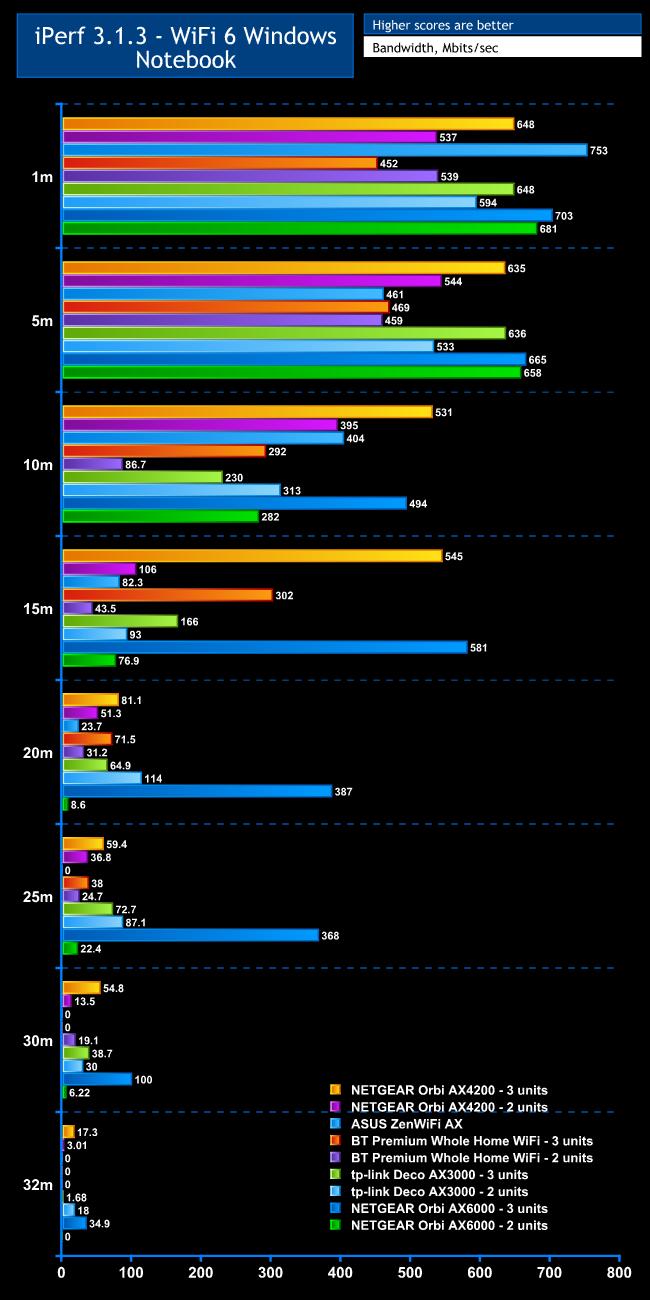802.11ax / WiFi 6 Results
WiFi 6 clients are what you are most likely to buy a WiFi 6 mesh system for, so we started with these tests. In theory, WiFi 6 can go all the way up to 9.6Gbits/sec, but that requires 160MHz wavebands at 5GHz and eight spatial streams, which no current products provide. The fastest theoretical WiFi 6 throughput in this group comes from the ASUS ZenWiFi AX, which can hit 4,808Mbits/sec.
The ASUS router's theoretically fast WiFi 6 shows itself at 1m, achieving 753Mbits/sec – faster than the NETGEAR Orbi AX6000, which has a similar WiFi 6 specification, but could only manage 703Mbit/sec in three-unit configuration, or 681Mbits/sec in two-unit configuration. NETGEAR's Orbi AX4200 with three units comes third with 648Mbits/sec, but strangely drops to 537Mbits/sec with two units. The BT Premium Whole Home WiFi mesh only manages 452Mbits/sec with three units and 539Mbits/sec with two. However, it should be pointed out that this will only be operating at 802.11ac / WiFi 5 speeds because it only uses WiFi 6 for the backhaul. The tp-link Deco AX3000 performs adequately, providing 648Mbits/sec with three units and 594Mbits/sec with two.
Moving out to 5m, the NETGEAR Orbi AX6000 pulls ahead, achieving 665Mbits/sec with three units and 658Mbits/sec with two. The NETGEAR Orbi AX4200 with three units and tp-link Deco AX3000 with three units perform nearly identically, deliverying 635 or 636Mbits/sec. With two units, the tp-link drops to 533Mbits/sec, and ASUS ZenWiFi AX to 461Mbits/sec. BT has fallen to 459Mbits/sec with two units, but goes up to 469Mbits/sec with three.
At 10m we're starting to see some two-unit configurations start to drop off. The three-unit NETGEAR Orbi AX4200 comes top with 531Mbits/sec, while the NETGEAR Orbi AX6000 manages 494Mbits/sec. The NETGEAR Orbi AX4200 is still doing well with two units, managing 395Mbits/sec, and the ASUS ZenWiFi 6 is holding up well at 404Mbits/sec. The NETGEAR Orbi AX6000 with two units has reduced to 282Mbits/sec. The BT three-unit configuration has also dropped off noticeably to 292Mbits/sec, and the tp-link three-unit configuration has fallen to 230Mbit/sec. With two units, BT is already way behind on 86.7Mbits, but tp-link is strangely faster, managing 313Mbits/sec. We suspect this is due to it having two rather than three radios.
The 15m distance is where the difference between mesh WiFi with three satellites starts to show its value over two satellites. The three-unit NETGEAR Orbi AX6000 dominates with 581Mbits/sec, and the NETGEAR Orbi AX4200 is managing 545Mbits/sec with three units, but only 106Mbits/sec with two, and the two-unit AX6000 has fallen further to 76.9Mbits/sec. The ASUS ZenWiFi AX has also dropped off considerably down to 82.3Mbits/sec, thanks to only having two units. BT's Premium Whole Home WiFi is offering a decent 302Mbits/sec with three units but only 43.5Mbits/sec with two. The tp-link Deco AX3000 is delivering 166Mbits/sec with three units and 93Mbits/sec with two.
At 20m the NETGEAR Orbi AX6000 with three units is way out in front with 387Mbits/sec, showing why it's worth the considerable extra outlay. With two units it's only deilvering 8.6Mbits/sec. Strangely, tp-link with two units is second with 114Mbits/sec – faster than it was at 15m. Coming in third is NETGEAR's Orbi AX4200 with three units at 81.1Mbits/sec, then BT with three units at 71.5Mbits/sec. ASUS has fallen off a cliff to 23.7Mbits/sec, tp-link with three units is delivering 64.9Mbits/sec, while the NETGEAR Orbi AX4200 with two units is managing 51.3Mbits/sec, but BT only 31.2Mbits/sec with two units.
The 25m distance pares things back still further, but the NETGEAR Orbi AX6000 dominates, stilll supplying an incredible 368Mbits/sec with three units. The ASUS ZenWiFi AX is already failing to send a signal to this range. The NETGEAR Orbi AX6000 with two units is still doing reasonably with 22.4Mbits/sec, but amazingly tp-link with two units is top with 87.1Mbits/sec, and third with two units at 72.7Mbits/sec. However, NETGEAR's Orbi AX4200 is still acquitting itself well, providing 59.4Mbits/sec with three units and 36.8Mbits/sec with two. BT is manages 38Mbits/sec with three units and 24.7Mbits/sec with two.
At 30m, strangely, the BT mesh has dropped off with three units but is still providing 19.1Mbits/sec with two. However, NETGEAR's Orbi AX6000 with three units is king at 100Mbit/sec, but only 6.22Mbits/sec with two. The three-unit Orbi AX4200 is second with 54.8Mbits/sec. The three-unit tp-link is still going strong at 38.7Mbits/sec, and so is the two-unit configuration with 30Mbits/sec. Two-unit NETGEAR Orbi AX4200 is hanging in at 13.5Mbits/sec.
With the 32m range, the client is also behind the garden shed, so we don't expect many WiFi setups to do well here. However, NETGEAR's Orbi AX6000 is still providing 34.9Mbits/sec, and the three-unit AX4200 17.3Mbits/sec. The two-unit tp-link also achieves a respectable 18Mbits/sec. Nothing else manages a usable bandwidth, two-unit NETGEAR Orbi AX4200 providing 3.01Mbits/sec, and three-unit tp-link just 1.68Mbits/sec. Everything else has dropped off completely.
Overall, then, NETGEAR's Orbi AX6000 with three units is the king of WiFi 6, with the three-unit Orbi AX4200 also doing commendably well. However, neither does so well with just two units. It was a shame we only had two ASUS ZenWiFi AX units, because that setup started off well, but dropped off fast and couldn't maintain range beyond 20m. BT's Premium Whole Home WiFi does well up to 25m with three or two units, although three units provides much better bandwidth, as you would hope. The tp-link Deco AX3000 delivers odd results, doing better overall with two units than three, making you wonder if the three-unit bundle is worth the extra money.
Next let's see how the mesh systems perform with a 2×2 802.11ac client.
 KitGuru KitGuru.net – Tech News | Hardware News | Hardware Reviews | IOS | Mobile | Gaming | Graphics Cards
KitGuru KitGuru.net – Tech News | Hardware News | Hardware Reviews | IOS | Mobile | Gaming | Graphics Cards



